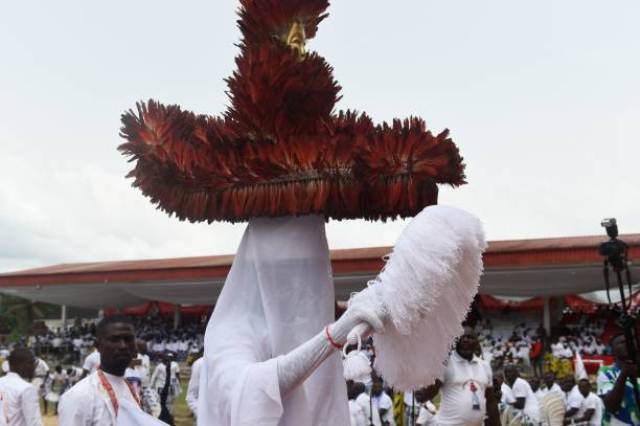Amaseikumor Festival is one of the ancient enduring Ijaw traditional festivals in Nigeria. It is celebrated annually by the Ijaws of Gbaramatu kingdom, Warri South West Local Government Area of Delta State, South-South, Nigeria.
According to elders of the kingdom, Amaseikumor Festival came into being at about 14AD. The Chief Priest who first performed the traditional ritual then was the Late Pa Obuko of Azama town.
Amaseikumor Festival has been celebrated between March/April yearly, and Oporoza town, the headquarters of the Gbaramatu kingdom, has served as the host to other communities under the kingdom and beyond.
Amaseikumor, as the name implies, means good living, peace, unity, prosperity, and protection to the people of the communities in Gbaramatu kingdom.
It is an ancient deity that emerged from the river, and since then, it has been celebrated by the entire Gbaramatu communities by laid down rules and regulations.
It is usually celebrated for seven days, and this year’s celebration was no exception.
Read Also: Sociocultural Implications Of The Depiction Of The Eyo Masquerade In Gangs Of Lagos
Throughout this period of elaborate traditional and cultural activities, Gbaramatu chiefs are expected to be in their enviable
traditional regalia, likewise people of the kingdom.
The first day of the festival is the Gbaraun Egbesu Owu Deinkoru or Masquerade Night Vigil day.
The second day is the Gbaraun Egbesu Festival day. This is the day when all sons and daughters of the kingdom, both home and abroad, come and confess their sins; the king, thereafter, prays for their forgiveness. It is binding on Gbaramatu indigenes, just like any other Ijaws, that blood covenant is forbidden, murder is a sin against God and the goddess of the land, adultery must not be mentioned amongst them let alone committing it, and evil thoughts against one another are forbidden as well. This stage lasts for three days.
The fifth day, that is the Ibolomobo-ere day, offers old women across the entire Ijaw nation an opportunity to pray for blessing and peace in Gbaramatu kingdom, the Ijaw nation, and the nation as a whole, after which the Pere (king) of Gbaramatu kingdom crowns it up with his prayer for the whole kingdom.
The sixth day is the Amaseikumor Osorbu Day while the seventh day witnesses the public outing of the Amaseikumor masquerade in its full glory.
This is the period the great Amaseikumor masquerade comes out to display, and consequently, the king offers prayers for the whole kingdom.
During the period of this festival, it is binding on all the communities in the Gbaramatu kingdom to attend and take active parts in the celebrations. This is because Amaseikumor Festival itself is a combination of several masquerades from different communities in the kingdom. Each of the communities is allowed to display the skills of her masquerades.
Amaseikumor Festival can be regarded as the most important and most highly celebrated festival in the Gbaramatu kingdom from the ancient days to date. Records from past celebrations and their significance, no doubt, makes an average Gbaramatu person hold the celebration in high esteem.
Amaseikumor Festival, according to investigations, heralds unprecedented peace in the Gbaramatu kingdom and her people. This has, therefore, established Amaseikumor as a deity of peace. Moreso, the people of the kingdom are more united and enjoy abundant blessings after the celebration. These blessings flow in diverse ways. For instance, there is usually an abundance flowing for fishermen, hunters, farmers, traders, etc. The people, in addition, also enjoy good health, safe delivery of pregnant women, and good neighbourliness.
Also, Amaseikumor Festival, according to research, is key to the protection of the people of the Gbaramatu kingdom. It was gathered that after the celebration, people are protected from premature death, accidents, ill-health and strange diseases, etc.
It is a standpoint and a symbol of unity that offers the entire people of Gbaramatu the opportunity to gather and unite as one during and after the festival. This is so as the communities in the kingdom do unanimously attend and actively participate in the festival with joy and happiness abiding by the rules and regulations guiding the festival.
It is a festival celebrated indeed to unite, restore and re-affirm the brotherhood of the entire Gbaramatu communities, as the people firmly believe that unity is strength.
Amaseikumor Festival has, no doubt endured and continues to retain its main features despite modernization in all aspects—political, economic, sociological, and technological developments.
The Gbaramatu Ijaws have not allowed modernization to becloud their culture as they still continuously maintain their stand in tradition and culture.
Source: Gbaramatu Voice Newspaper


